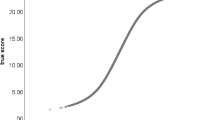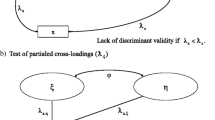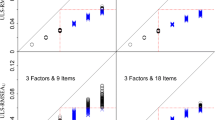Abstract
This paper focuses on two estimators of ability with logistic item response theory models: the Bayesian modal (BM) estimator and the weighted likelihood (WL) estimator. For the BM estimator, Jeffreys’ prior distribution is considered, and the corresponding estimator is referred to as the Jeffreys modal (JM) estimator. It is established that under the three-parameter logistic model, the JM estimator returns larger estimates than the WL estimator. Several implications of this result are outlined.
Similar content being viewed by others
References
Birnbaum, A. (1968). Some latent trait models and their use in inferring an examinee’s ability. In F.M. Lord & M.R. Novick (Eds.), Statistical theories of mental test scores. Reading: Addison-Wesley (Chaps. 17–20).
Birnbaum, A. (1969). Statistical theory for logistic mental test models with a prior distribution of ability. Journal of Mathematical Psychology, 6, 258–276.
Hoijtink, H., & Boomsma, A. (1995). On person parameter estimation in the dichotomous Rasch model. In G.H. Fischer & I.W. Molenaar (Eds.), Rasch models. Foundations, recent developments, and applications (pp. 53–68). New York: Springer.
Jeffreys, H. (1939). Theory of probability. Oxford: Oxford University Press.
Jeffreys, H. (1946). An invariant form for the prior probability in estimation problems. Proceedings of the Royal Society of London. Series A, Mathematical and Physical Sciences, 186, 453–461.
Lord, F.M. (1980). Applications of item response theory to practical testing problems. Hillsdale: Lawrence Erlbaum.
Lord, F.M. (1983). Unbiased estimators of ability parameters, of their variance, and of their parallel-forms reliability. Psychometrika, 48, 233–245.
Lord, F.M. (1984). Maximum likelihood and Bayesian parameter estimation in item response theory (Research Report No. RR-84-30-ONR). Princeton, NJ: Educational Testing Service.
Magis, D., & Raîche, G. (2010). An iterative maximum a posteriori estimation of proficiency level to detect multiple local likelihood maxima. Applied Psychological Measurement, 34, 75–90.
Meijer, R.R., & Nering, M.L. (1999). Computerized adaptive testing: Overview and introduction. Applied Psychological Measurement, 23, 187–194.
Rasch, G. (1960). Probabilistic models for some intelligence and attainment tests. Copenhagen, Denmark: Danish Institute for Educational Research.
Samejima, F. (1973). A comment on Birnbaum’s three-parameter logistic model in the latent trait theory. Psychometrika, 38, 221–223.
Warm, T.A. (1989). Weighted likelihood estimation of ability in item response models. Psychometrika, 54, 427–450.
Author information
Authors and Affiliations
Corresponding author
Rights and permissions
About this article
Cite this article
Magis, D., Raîche, G. On the Relationships Between Jeffreys Modal and Weighted Likelihood Estimation of Ability Under Logistic IRT Models. Psychometrika 77, 163–169 (2012). https://doi.org/10.1007/s11336-011-9233-5
Received:
Revised:
Published:
Issue Date:
DOI: https://doi.org/10.1007/s11336-011-9233-5




